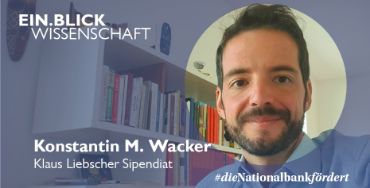Konstantin M. Wacker
Holder of the Klaus Liebscher Economic Research Scholarship (KLERS) 2020/2021 (as an assistant professor at the University of Groningen)Where research meets economic policy –
an interview with a KLERS researcher at the OeNB

Why this scholarship?
I have always been interested in the intersection between research and policymaking. Prior to my academic career, I worked at the World Bank and the European Central Bank. Thanks to the KLERS program, I am now in a position to exchange knowledge with colleagues who are involved in economic policymaking in their day-to-day business, including policy discussions at the ECB level. At the same time, I can maintain an active role in academic research. What is more: Based on the OeNB’s external statistics, I can conduct certain analyses which wouldn’t be possible otherwise.
What’s your research area?
In my research, I mainly focus on globalization issues and macroeconomic developments. In the past, I primarily did research on multinational corporations’ foreign direct investment. Right now, I am taking a closer look at export quality, mainly drawing on empirical data and methods.
Which project proposal did you submit when you applied for the KLERS program?
My project analyzes payment flows resulting from cross-border investments and how these affect imbalances at the European and global level. For example, if an Austrian investor receives a return on her direct investment in Romania, this affects both countries’ balance of payments.
What is interesting about this topic in particular?
Cross-border investment incomes contribute considerably to imbalances in the euro area. However, this topic does not feature as prominently in today’s policy discourse as the traditional trade balance, even though these two issues are intrinsically linked. Likewise, academic research on this topic is still in its early stages.
What does the KLERS program focus on? And how does it work?
Applications need to be handed in by the end of October for the following year. The KLERS program gives researchers in economics and finance the opportunity to contribute their expertise at the OeNB based on a consultancy service agreement. Applicants are invited to submit their own proposal – but there may be some tweaking before a final agreement with the OeNB is reached. Sometimes, the focus or details of the proposed project may need to be adjusted. At least with my project this was the case, and I appreciated the feedback and suggestions. After all, the idea is for KLERS researchers to have an active exchange with their colleagues at the OeNB.
What does your cooperation with OeNB colleagues look like, now that everyone is working in alternating split teams, i.e. from home every other week?
The exchange of essential information works fine – more than one year into the pandemic, we’re all used to remote communication. The first online seminar on my research topic was very lively, provoking some controversial discussions – a welcome change from working at home in quasi-isolation. Still, it would be nice to go for coffee or lunch with my colleagues every now and then to have some informal, spontaneous exchanges and to build better contacts. Often, people have the best ideas over coffee. So I appreciate it when colleagues at the OeNB who are interested in exchanging ideas with me, get in touch. We will always find a suitable communication channel.
How is your research work coming along? Are there any findings you can already share?
So far, I have made two notable observations: For one thing, imbalances arising from capital income reflect the division of labor in Europe. In particular Germany, which is at the end of many production chains, generates surpluses from affiliates abroad; the “extended workbenches” in Central and Eastern Europe have corresponding payment outflows. Germany is a very interesting case altogether because inflows and outflows have a very different structure. For another, there are eye-catching results for other countries, i.e. those that are often seen as European tax havens by large groups. In Ireland and Luxembourg, for example, net outflows caused by foreign capital income amount to 20% and 15% of GDP, respectively.
Do you have any suggestions for applicants?
For my application, I was careful to choose a research topic that is relevant for economic policy and thus interfaces with the OeNB’s work. I also carefully worded my proposal, trying to stay away from excess technical jargon and details to make the relevance of my topic clearly accessible to a broad audience.
